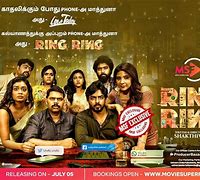“A birthday celebration turns into a battlefield of secrets, but does the drama hold up?”
Introduction
Single-location dramas thrive on strong writing, engaging performances, and a sense of mounting tension. Whether it’s a mystery, thriller, or relationship drama, the setting should enhance the story rather than restrict it. Ring Ring attempts to explore the theme of privacy in modern relationships, using mobile phones as a device to unveil hidden truths. However, instead of a gripping narrative, the film becomes a tiresome series of forced revelations, questionable character motives, and exaggerated conflicts that fail to feel organic.
Plot Summary
A group of four couples gathers at Shiva’s birthday party, expecting a fun evening. However, what starts as casual banter escalates when Kathir (Daniel Annie Pope) provokes Thyagu (Vivek Prasanna), a short-tempered lawyer, about his phone habits. In a bid to prove his honesty, Thyagu proposes a game—every call and message received must be openly shared. What begins as a light-hearted challenge quickly spirals into an interrogation, uncovering the private lives of each individual. As secrets spill out one by one, trust breaks down, relationships shatter, and the night takes an irreversible turn.
Analysis
- A Concept That Lacks Depth
The film is built on a simple yet intriguing idea: how much do we really hide on our phones? While similar concepts have been executed effectively in films like Perfect Strangers (2016), Ring Ring fails to explore the psychological complexity of its characters. Instead of developing layered personalities, the screenplay turns them into caricatures, reducing infidelity and deception to shallow theatrics.
- Unnatural Character Interactions
The way the game escalates is highly unconvincing. Realistically, a group of friends wouldn’t persistently push each other into exposing private messages unless there was already deep-seated hostility. Yet, in Ring Ring, they act as if this is the only way to settle scores. The film doesn’t establish any prior tensions strong enough to justify such extreme reactions.
- Lack of Visual Engagement
A single-location setting doesn’t have to be visually dull, as seen in classics like 12 Angry Men (1957) or recent Tamil films like Jeeva’s Black. Creative cinematography, strong dialogues, and well-timed reveals can make these narratives thrilling. However, Ring Ring struggles with repetitive close-ups and static framing, making it visually monotonous. The dinner table setup remains unchanged, and the absence of movement drains energy from the scenes.
- Poorly Written Female Characters
The women in Ring Ring exist only as catalysts for male conflicts. While the film initially hints at their own secrets, they are mostly sidelined until the final act. Even then, their revelations feel like afterthoughts rather than meaningful arcs. A more balanced screenplay would have explored both genders’ perspectives equally.
- Performances and Dialogues
Vivek Prasanna delivers an energetic performance, especially in heated moments. His chemistry with Swayam Siddha adds some authenticity to their strained relationship.
Daniel Annie Pope plays his role well but is reduced to an over-the-top, hyperactive instigator.
Sakshi Agarwal looks striking on screen but gets very limited scope to perform.
The dialogues often feel forced, with characters stating their thoughts rather than allowing emotions to build naturally.
Final Verdict
While Ring Ring sets up an intriguing premise about secrecy in modern relationships, it fails to craft a compelling drama. The lack of logical character behavior, forced conflicts, and repetitive setting make it a tedious watch. If executed with better writing and visual storytelling, this could have been a gripping chamber drama.
⭐ Rating: 2/5
Verdict: “A dinner party filled with drama but lacking depth—this game of secrets overstays its welcome.”









